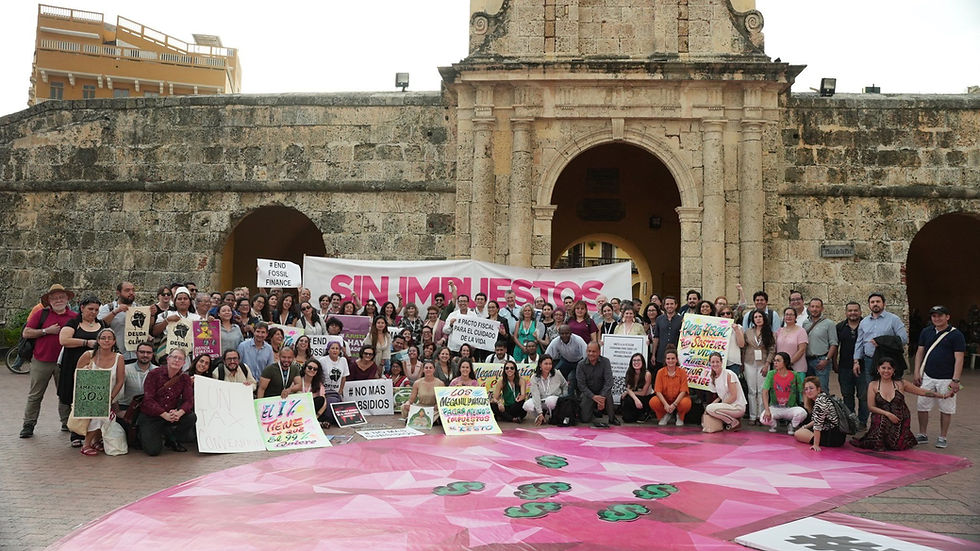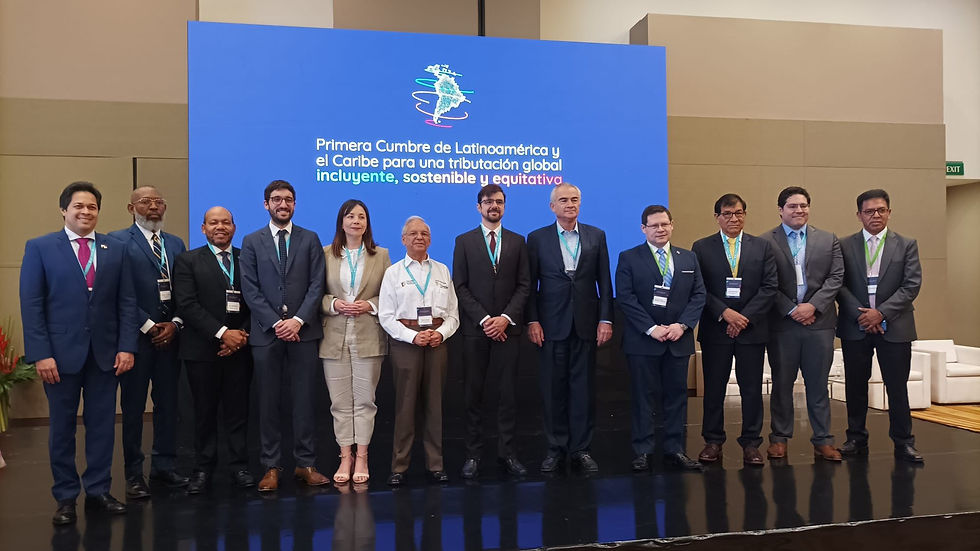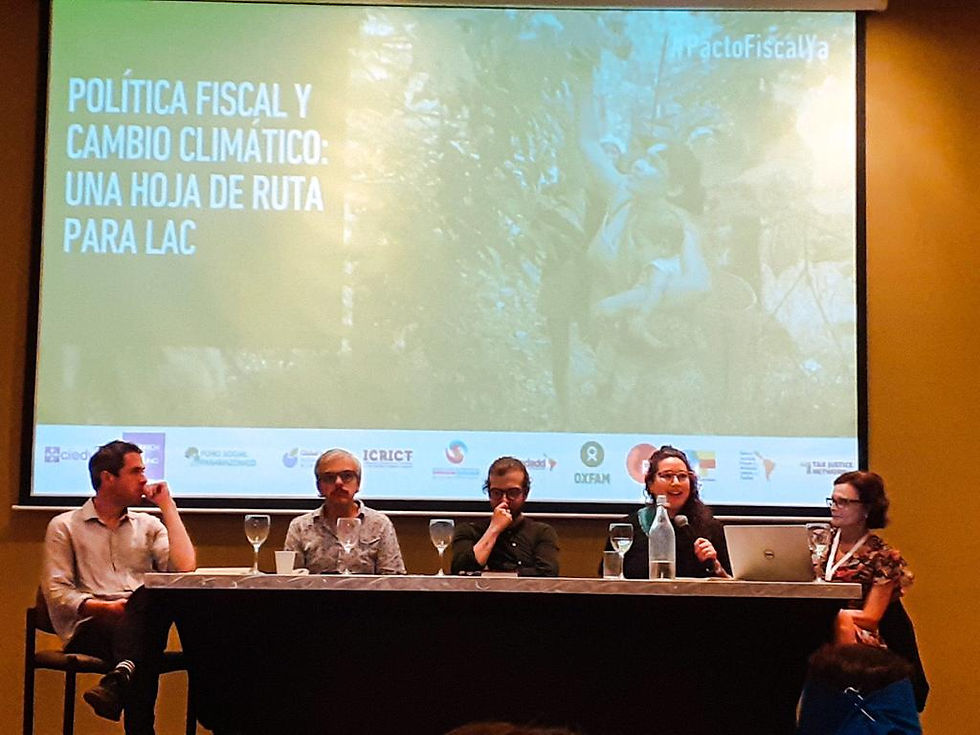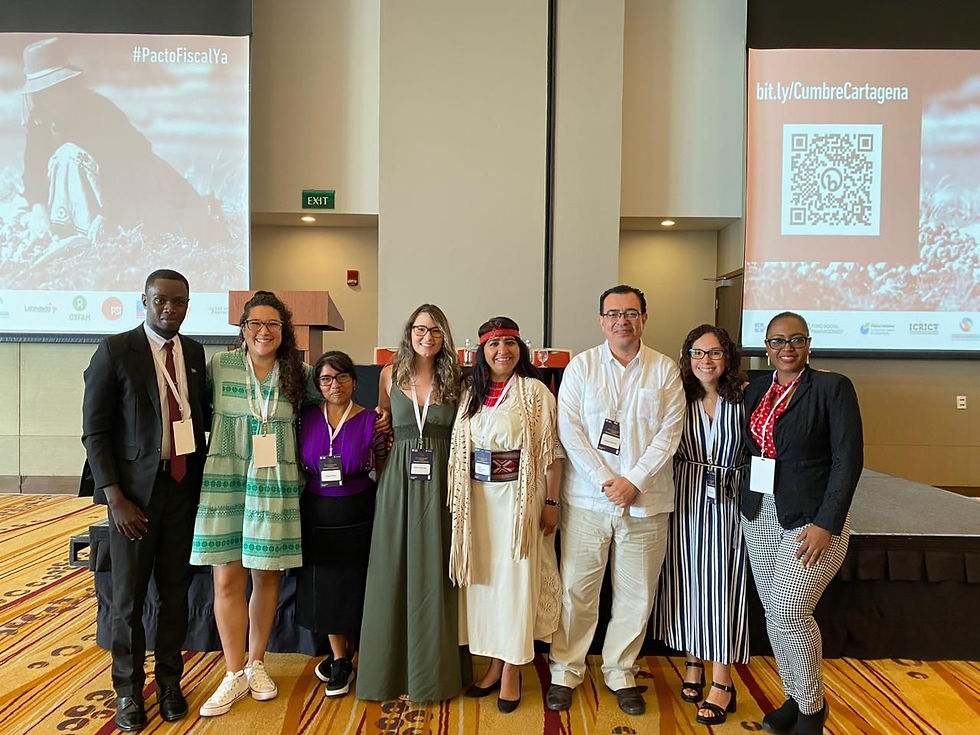Hacia una Tributación Global Sostenible: Avances de la Cumbre de política fiscal en LAC
- Dra. Sandra Guzmán

- 3 ago 2023
- 6 Min. de lectura
Actualizado: 4 ago 2023

Por: Sandra Guzmán, Directora General, GFLAC / Marisol Marín, Coordinadora de Comunicación, GFLAC
Se realizó la primera Cumbre de América Latina y el Caribe para una Tributación Global Incluyente, Sostenible y Equitativa en Cartagena, Colombia, los días 27 y 28 de julio, donde se propuso una cooperación regional en materia tributaria para hacer frente a retos que tienen los países de la región y del mundo, como evasión fiscal, paraísos fiscales y otros que comprometen las economías y el bienestar de la población.
Pese a que la representación de las y los funcionarios de 11 países de los 16 confirmados, no fueron de alto nivel, se tomaron importantes decisiones como la de crear una Plataforma, en cuyos objetivos se destaca la construcción de una posición unificada a nivel regional que fortalezca la voz de América Latina y el Caribe en las negociaciones internacionales sobre asuntos tributarios. Esto representa una oportunidad sin precedentes para abogar por políticas fiscales que promuevan la justicia, la equidad y la sostenibilidad en el contexto global.

Como parte de las prioridades, los países identificaron temas de suma importancia que serán trabajados a partir de este encuentro, entre ellos la progresividad del sistema tributario, beneficios tributarios, tributación ambiental y la tributación relacionada con la era digital y las nuevas formas de trabajo.
Es importante resaltar que las discusiones en Cartagena, no se limitaron a las reuniones oficiales entre ministros de finanzas y representantes de los países, que se hicieron a puerta cerrada con espacios solo para diez representantes de la sociedad civil. Precisamente, del 25 al 28 de julio, diversas organizaciones de la sociedad civil, impulsadas por un grupo motor de organizaciones, a la que se sumaron decenas de organizaciones como GFLAC, trabajaron arduamente para presentar propuestas concretas para garantizar que los acuerdos alcanzados fueran justos, inclusivos y sostenibles. Las recomendaciones de las organizaciones enfatizaron la importancia de considerar visiones transversales como el respeto a los derechos humanos y el cumplimiento de la agenda de los objetivos de desarrollo sostenible, como principios fundamentales en la toma de decisiones fiscales, así como la promoción de la progresividad y equidad en los sistemas tributarios y la revisión de beneficios tributarios con transparencia y equidad.

En el ámbito específico del cambio climático, GFLAC y organizaciones aliadas destacaron la importancia de promover el establecimiento de un precio al carbono, la reducción de los subsidios a los combustibles fósiles, el tratamiento de la deuda como vía para ampliar el espacio fiscal y establecer una tributación ambiental que proteja la naturaleza, la biodiversidad y fomente la transición energética justa. Esto para desacoplar el modelo de desarrollo de las actividades extractivas y generar ingresos que se inviertan en la transición sin dejar a nadie atrás. Además, se abogó por promover mejores estándares de transparencia, resaltando la importancia de la implementación efectiva del Acuerdo de Escazú como una vía para garantizar el acceso a información, a la justicia y a la participación en asuntos fiscales que conciernen al ambiente y a la lucha contra el cambio climático.
En este sentido, desde GFLAC participamos en las conversaciones sobre política fiscal y cambio climático brindando insumos derivados del aprendizaje obtenido en el marco del Índice de Finanzas Sostenibles (IFS) y las recomendaciones derivadas del mismo en el marco de la política fiscal y de transparencia.

Si bien las entidades de gobierno reconocieron el rol que la sociedad civil tiene, no se especificó cuál será el mecanismo de participación respecto a la Plataforma creada. No obstante, se ha señalado que la Comisión Económica para Latinoamérica y el Caribe (CEPAL) tendrá la secretaría técnica, mientras que el gobierno de Colombia tendrá la presidencia por un año. En este sentido, la CEPAL y la Presidencia deberán establecer los mecanismos para garantizar una adecuada participación de la sociedad civil en el proceso.
En conclusión, la primera Cumbre de América Latina y el Caribe para una Tributación Global Incluyente, Sostenible y Equitativa representa un paso importante hacia la construcción de un futuro más justo y sostenible para la región y el mundo. En el futuro inmediato será necesario un trabajo colaborativo entre gobiernos, en donde la participación de los ministros de finanzas, pero también los ministerios de medio ambiente, y otros relevantes, será fundamental. Además de una participación adecuada y activa de la sociedad civil, que es la memoria de muchos de estos procesos, pues los gobiernos cambian con el tiempo y con ello las prioridades. El éxito de la Plataforma por tanto dependerá de un balance entre lo técnico y lo político, tomando en cuenta las diferentes necesidades de los países, pero guiándose por un objetivo común de cara a una política tributaria equitativa, inclusiva y verdaderamente sostenible, que pueda adoptarse no solo regionalmente sino también a nivel global.

Desde GFLAC agradecemos a las organizaciones del grupo motor como son Oxfam México, Latindadd, la Red de Justicia Fiscal, CIEDUR, Foro Social Panamazónico, la Iniciativa Global de Derechos Económicos, Sociales y Culturales, ICRICT, Iniciativa por los Principios de Derechos Humanos en la política Fiscal y otras, por hacer posible la participación de sociedad civil en esta importante conversación, cuyo proceso comienza y en el cual trabajaremos arduamente.
Towards a Sustainable Global Taxation: Advances from the Fiscal Policy Summit in Latin America and the Caribbean

On July 27th and 28th, the Caribbean Summit for an Inclusive, Sustainable, and Equitable Global Tax was held in Cartagena, Colombia. During the summit, regional cooperation on tax matters was proposed to address challenges faced by countries in the region and around the world, such as tax evasion, tax havens, and other issues that impact economies and the well-being of the population.
Even though the representation of officials from 11 out of the 16 confirmed countries was not at the highest level, significant decisions were made, including the creation of a platform with the objective of building a unified regional position to strengthen the voice of Latin America and the Caribbean in international tax negotiations. This represents an unprecedented opportunity to advocate for fiscal policies that promote justice, equity, and sustainability in the global context.

As part of the priorities identified, countries highlighted several crucial issues that will be addressed following this meeting, including the progressivity of the tax system, tax benefits, environmental taxation, and taxation related to the digital era and new forms of work.
The discussions in Cartagena went beyond the closed-door official meetings between finance ministers and representatives of countries. From July 25th to the 28th, various civil society organizations, driven by a core group of organizations and joined by dozens of others like GFLAC, worked together to present concrete proposals to ensure that the agreements reached were fair, inclusive, and sustainable. The recommendations emphasized the importance of considering cross-cutting perspectives, such as respect for human rights and the fulfillment of the Sustainable Development Goals, as fundamental principles in making fiscal decisions. The promotion of progressivity and equity in tax systems and the transparent review of tax benefits were also highlighted.
Regarding the specific issue of climate change, GFLAC and allied organizations emphasized the importance of promoting the establishment of a carbon price, reducing subsidies for fossil fuels, treating debt to expand fiscal space, and implementing environmental taxation to protect nature, biodiversity, and promote a just energy transition. This aims to decouple the development model from extractive activities and generate income for an inclusive transition that leaves no one behind. Additionally, efforts were made to promote higher transparency standards, underscoring the importance of the effective implementation of the Escazú Agreement to guarantee access to information, justice, and participation in fiscal matters related to the environment and the fight against climate change.
In this context, GFLAC participated in discussions on fiscal policy and climate change, providing insights from the knowledge gained through the Sustainable Finance Index (SFI) and the resulting recommendations in the areas of fiscal policy and transparency.

While government entities acknowledged the role of civil society, the specific mechanism for civil society participation in the created Platform was not specified. However, it was indicated that the Economic Commission for Latin America and the Caribbean (ECLAC) would provide technical support, while the government of Colombia would hold the presidency for one year. In this regard, ECLAC and the Presidency should establish mechanisms to ensure adequate civil society participation in the process.
In conclusion, the first Caribbean Summit for an Inclusive, Sustainable, and Equitable Global Tax represents a significant step towards building a fairer and more sustainable future for the region and the world. Immediate collaborative efforts among governments are necessary, involving not only finance ministers but also environmental and other relevant ministries. Adequate and active civil society participation, which carries the memory of many of these processes as governments change over time, is also crucial. The success of the Platform will thus depend on a balance between technical and political considerations, considering the unique needs of countries but guided by a common objective of pursuing an equitable, inclusive, and truly sustainable tax policy that can be adopted not only regionally but also globally.

GFLAC expresses its gratitude to the core group of organizations, such as Oxfam Mexico, Latindadd, the Tax Justice Network, CIEDUR, the Pan-Amazonian Social Forum, the Global Initiative for Economic, Social, and Cultural Rights, ICRICT, the Initiative for Human Rights Principles in Fiscal Policy, and others, for making civil society participation in this crucial conversation possible. The process has just begun, and GFLAC will work tirelessly to contribute to it.


.png)

Comentarios